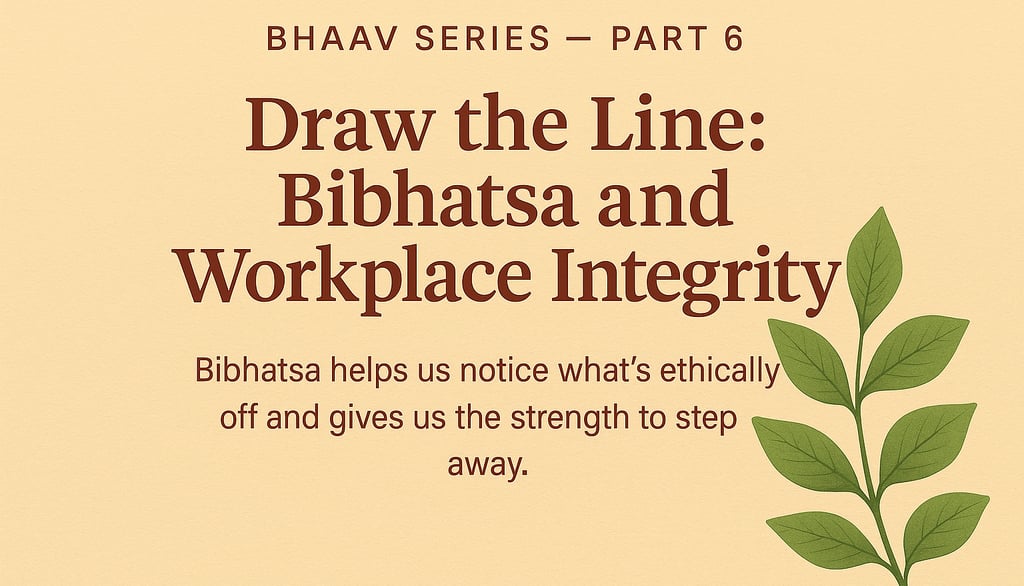Bhaav Series – Part 6 of 15: Draw the Line- Bibhatsa and Workplace Integrity
In a world where fitting in often overshadows standing firm, Bibhatsa Bhaav—the feeling of moral repulsion—reminds us to pause, reflect, and choose integrity. This post explores how the emotion of disgust can be a compass for ethical clarity at work. From saying no to toxic gossip to walking away from shady deals, Bibhatsa helps us define our boundaries with dignity. Learn how this powerful yet often misunderstood emotion can help cleanse your professional environment, align your work with your values, and create space for authenticity and self-respect.
Abhay Jaiswal
4/23/20252 min read


Not all emotions at work feel warm or welcoming. Some show up to protect us, cleanse our space, and preserve our values. One such emotion in Indian aesthetic thought is Bibhatsa Bhaav—the feeling of rejection, discomfort, or moral disgust.
Now, the word disgust might sound harsh. But in deeper Indian philosophy, Bibhatsa isn’t about looking down on others—it’s about listening to that inner discomfort when something doesn’t feel right. It's the inner voice that nudges you and says,
“This… doesn’t sit well with me.”
In the professional world, Bibhatsa helps us draw lines—between what we are willing to tolerate and what we must reject to stay true to ourselves.
Here’s how Bibhatsa quietly shows up at work:
Hearing gossip in a group chat—and choosing not to engage
Getting invited into a shady deal—but backing away before things cross a line
Noticing toxic humour or passive bullying—and gently calling it out
Watching someone be sidelined—and voicing that it’s unfair
Declining to copy unethical practices even when it’s the norm
Feeling emotionally off in a meeting—and trusting that feeling to reflect, speak, or exit
These aren’t dramatic moments. They’re subtle shifts. Quiet refusals. Internal decisions. But they carry immense weight.
Bibhatsa Bhaav is a moral filter. It keeps our professional space from getting polluted. It protects our peace of mind, our emotional energy, and our sense of justice.
And the strength it offers is powerful—not because it fights, but because it walks away with dignity. Because it dares to say:
“This doesn’t align with who I am.”
When we listen to Bibhatsa, we’re not being negative—we’re being clear. Clarity about what we stand for, and more importantly, what we won’t stand for.
This Bhaav gives us permission to detach—not in apathy, but in self-respect. It gives us the courage to step back, reset, and preserve our integrity. In doing so, it teaches us that boundaries are not barriers—they are self-care in motion.
Bibhatsa might not be the most celebrated emotion at work. But it’s one of the most essential. Because integrity isn’t always about doing more. Sometimes, it’s about knowing when to say enough.
In Next Post, we’ll meet Bhayānaka – The Power of Fear, and how it becomes courage when held with awareness.
Until then, take a moment to notice what your inner self rejects. Honour that discomfort. It might just be your wisdom speaking. You don’t have to accept everything. Sometimes, the most powerful move is to walk away—with calm, with clarity, and with grace.
#BhaavSeries #Bibhatsa #WorkplaceIntegrity #DrawTheLine #InnerWisdom #MindfulBoundaries #IndianPhilosophy #LeadershipWithValues #BhavaAtWork #CleanCulture #EmotionalWisdom
Committed for better India 🇮🇳 © 2025 ABHAY JAISWAL
